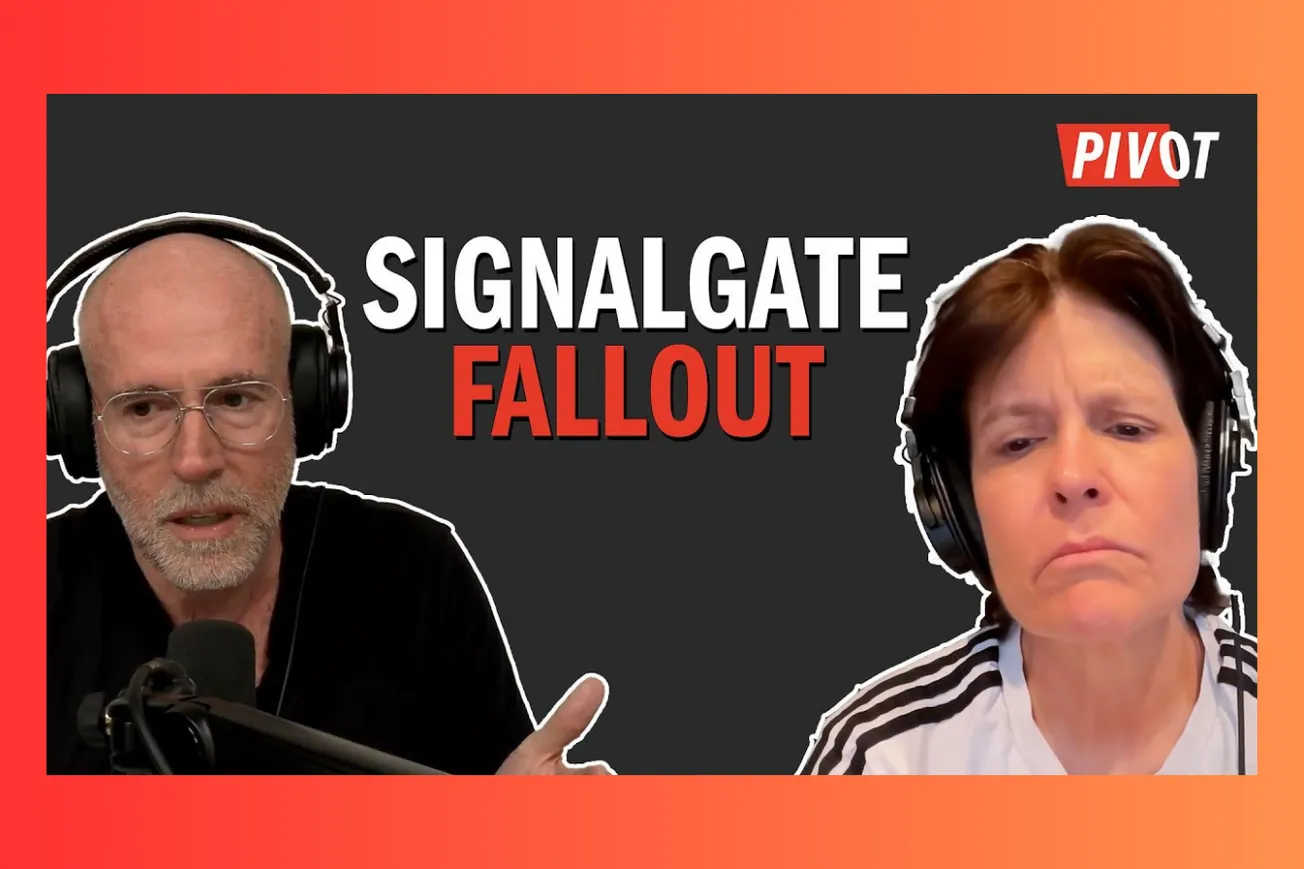Table of Contents
A damning security breach reveals Trump's defense team sharing classified war plans on consumer messaging apps while dodging accountability.
Key Takeaways
- Defense Secretary Pete Hegseth shared classified Yemen attack details including aircraft descriptions and timelines via Signal
- National security officials used personal phones and commercial apps to discuss sensitive military operations outside secure channels
- Jeffrey Goldberg of The Atlantic was accidentally added to the group and properly reported the breach after attacks concluded
- Administration officials denied wrongdoing despite clear protocol violations, calling it "not classified information" when it demonstrably was
- The breach potentially exposed operational details to foreign adversaries who could have repositioned assets to target American forces
- Trump's team applied different standards than they demanded for Hillary Clinton's email practices, revealing systematic hypocrisy
- No accountability measures have been implemented, with officials focusing on attacking the messenger rather than addressing security failures
- The incident highlights broader concerns about competence and protocol adherence in sensitive national security positions
- Commercial messaging apps like Signal lack the security infrastructure required for classified government communications
Security Protocols Violated on Multiple Levels
The scope of the security breach extends far beyond a simple messaging mistake. Defense Secretary Pete Hegseth transmitted classified information about Yemen operations, including specific aircraft involved and operational timelines, through Signal—a commercial messaging application never intended for government use. The leaked messages contained what Hegseth himself described as "units, locations, routes, flight paths" despite his public denials, along with detailed descriptions of the aircraft involved in the operation.
National security officials participating in these conversations were operating outside established secure communication channels, likely using personal devices on unsecured networks rather than the specialized SCIF environments designed for sensitive discussions. The Signal CEO herself reportedly expressed disbelief that government officials were using their platform for classified communications, noting that while journalists and others use Signal for encrypted communications, it remains a commercial application unsuitable for government secrets.
The technical violations compound the security risks exponentially. Government officials are required to use specially secured phones that cannot sideload applications like Signal and must conduct classified communications within SCIFs (Sensitive Compartmented Information Facilities)—protected environments specifically designed to prevent electronic surveillance. When visiting NSA or CIA buildings, even civilians cannot bring personal phones inside, yet senior officials were casually discussing war plans on personal devices.
Most alarmingly, National Security Advisor Mike Waltz had configured Signal with four-week message disappearance settings, suggesting deliberate attempts to avoid accountability and record-keeping requirements. Government communications on such matters are supposed to be preserved, not automatically deleted.
Democratic Congressman Jim Himes articulated the worst-case scenario during congressional hearings: "Everyone here knows that the Russians or the Chinese could have gotten all of that information and they could have passed it on to the Houthis who easily could have repositioned weapons and altered their plans to knock down planes or sink ships." The fact that American pilots weren't killed appears to be "by the awesome grace of God" rather than proper security protocols.
Hypocrisy Exposed Through Past Statements
The administration's response becomes particularly problematic when compared to their previous positions on information security. Secretary Hegseth previously stated that "any security professional, military, government or otherwise, would be fired on the spot for this type of conduct and criminally prosecuted for being so reckless with this kind of information." This referred to Hillary Clinton's email server—a situation involving significantly less sensitive operational details. Hegseth also questioned "How damaging is it to your ability to recruit or build allies with others when they are worried that our leaders may be exposing them because of their gross negligence or their recklessness in handling information?"
Marco Rubio declared "nobody is above the law, not even Hillary Clinton," while CIA Director John Ratcliffe emphasized that "mishandling classified information is still a violation of the Espionage Act—that's a criminal charge so serious that it can bring the death penalty." National Security Advisor Mike Waltz told CNN about Clinton's emails: "Any unauthorized release of classified information is a violation of the law and will be treated as such." Tulsi Gabbard insisted that "any unauthorized release of classified information is a violation of the law and will be treated as such."
Perhaps most ironically, one of the leaked Signal messages shows Hegseth writing "We are currently clean on OPSEC," meaning operational security protocols were supposedly in place and trustworthy. This occurred while he was simultaneously violating basic security protocols by discussing classified information on an unsecured commercial platform.
The contrast becomes even starker when examining the relative severity of violations. Clinton's private email server, while problematic, didn't involve real-time operational planning shared on commercial messaging platforms during active military operations. The Signal breach occurred in the context of ongoing combat operations where leaked information could have immediately endangered American forces.
Crisis Management Failures Compound Original Error
Standard crisis management requires three elements: acknowledging the problem, taking responsibility, and implementing corrective measures. The administration has failed on all fronts, instead choosing deflection and denial. Rather than admitting the security breach was unacceptable, officials have argued semantics about whether the shared information constitutes "war plans" or "classified material." Hegseth told reporters: "There's no units, no locations, no routes, no flight paths, no sources, no methods, no classified information" despite evidence showing exactly those details were shared.
Press Secretary Karine Jean-Pierre's suggestion that Elon Musk's technical experts investigate how Goldberg accessed the chat represents a fundamental misunderstanding of both the problem and appropriate solutions. The issue isn't technical infiltration—it's administrative incompetence in basic security protocols. Jean-Pierre also falsely claimed The Atlantic was "failing" and "falling apart," when CEO Nick Thompson corrected the record noting record subscriber growth, increased advertising revenue, profitability, and expansion of print issues and podcasts.
The administration's messaging strategy appears focused on attacking Jeffrey Goldberg personally rather than addressing the security failure. Officials have variously claimed they "never met" Goldberg (despite documented interactions), suggested he was a spy or hoax perpetrator, and attempted to discredit The Atlantic's reporting. This mirrors Trump's typical response pattern of claiming he doesn't know people who worked closely with him for years.
This approach reflects Donald Trump's broader strategy of never acknowledging mistakes, derived from Roy Cohn's influence of "never never acknowledge that you're wrong and just continue to lie." However, this strategy proves particularly dangerous in national security contexts where trust and protocol adherence form the foundation of effective operations. The administration missed opportunities for damage control by failing to implement the crisis management example set by Johnson & Johnson during the Tylenol cyanide scare, when the company immediately pulled all products nationwide to restore public trust.
Jeffrey Goldberg's Professional Response Highlights Proper Protocols
The Atlantic's Jeffrey Goldberg demonstrated exactly how security breaches should be handled. Upon realizing he had been erroneously added to a classified discussion, he voluntarily exited the group and waited until after military operations concluded before reporting the incident. He understood that releasing information during active operations could endanger American forces, showing more security consciousness than the senior officials who created the breach.
The incident likely occurred due to mistaken identity—someone with similar initials (possibly "JG") was intended for the group. Such mix-ups happen regularly in digital communications, but the severity of consequences depends entirely on the sensitivity of the information being shared. Similar mistakes have occurred with tech company earnings reports and internal communications, but those don't typically involve operational military details.
When administration officials questioned his reporting and suggested the information wasn't classified, Goldberg released the actual message transcripts, proving the conversations included specific operational details about aircraft, timing, and targeting. His measured response—not immediately publishing but waiting for appropriate timing, then providing evidence when challenged—exemplifies journalistic responsibility and security awareness.
The administration's subsequent attacks on Goldberg represent classic misdirection tactics—shifting blame to the messenger rather than addressing the underlying security failure. However, Goldberg's professional handling of the situation has earned him recognition as someone who "did everything right ethically" and understands security protocols better than the officials who created the breach.
The role of Laurene Powell Jobs, owner of The Atlantic, also deserves recognition for supporting continued reporting despite inevitable political pressure. Unlike other media owners who have settled lawsuits or scaled back criticism of the Trump administration, Powell Jobs has maintained editorial independence, allowing The Atlantic to continue publishing despite threats and attacks on both the publication and Goldberg personally.
Broader Implications for Military Effectiveness and Allied Relations
Military effectiveness depends fundamentally on trust between service members and leadership. Pilots flying missions at "two times the speed of sound avoiding surface-to-air missiles" must trust that operational details remain secure and that ground-based intelligence won't accidentally reveal their positions to hostile forces. When officials casually share targeting information and flight paths through commercial apps, it undermines the basic covenant between those risking their lives in combat and those directing operations from secure locations.
The breach raises serious questions about the "other 79 times" such violations may have occurred undetected. Like drunk driving, security breaches often represent patterns of behavior rather than isolated incidents. The casual nature of these communications suggests systemic disregard for protocols rather than a one-time mistake.
Similarly, allied intelligence sharing requires confidence that sensitive information won't be carelessly transmitted through commercial applications accessible to foreign intelligence services. The breach raises serious questions about how foreign partners will view information security within the Trump administration, potentially limiting crucial intelligence cooperation. How will allies share sensitive information with what one host called a "clown car" of officials who can't follow basic security protocols?
The incident also undermines America's ability to project moral authority internationally. Officials who previously criticized other nations for corruption and security lapses now face questions about their own professional standards and accountability measures. The contrast becomes particularly stark when considering America's history of using military force to establish rule of law and security protocols in other regions.
The damage extends beyond immediate operational concerns to long-term military recruitment and morale. Service members must trust that their safety depends on competent leadership following established protocols. When senior officials demonstrate casual disregard for security measures, it erodes confidence throughout the chain of command and potentially impacts willingness to serve in high-risk positions.
Trump's inconsistent response—simultaneously suggesting his team "fucked up" while defending them and attacking Jeffrey Goldberg—further erodes confidence in administrative competence and decision-making processes. This mixed messaging creates confusion about actual standards and expectations for security protocol adherence.
The Signal security breach represents more than an isolated incident—it reveals systematic disregard for established protocols and accountability measures that protect American interests. The hosts predict someone will eventually face consequences as a "blood offering" to manage political embarrassment, with speculation focusing on either Pete Hegseth or Mike Waltz as potential scapegoats. However, without addressing underlying cultural problems that prioritize loyalty over competence and convenience over security, similar violations will likely continue endangering national security operations and military personnel worldwide.





